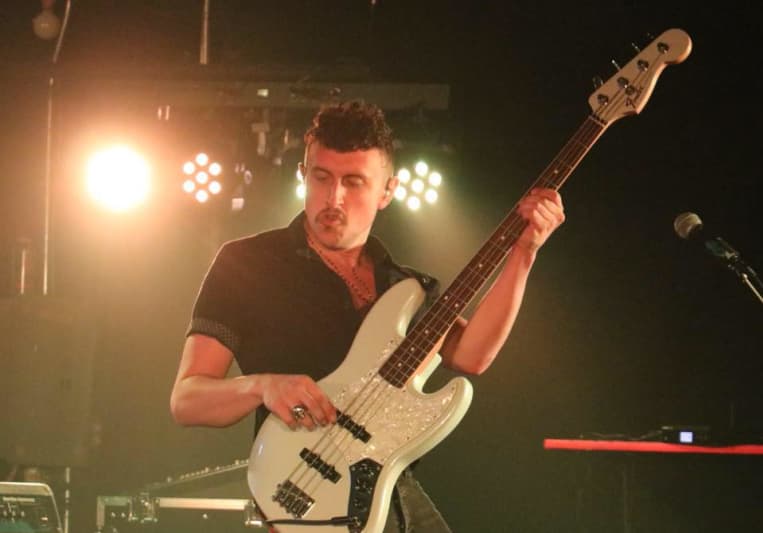
Teddy Gordon-Stevens is a professional touring and studio bass player with over 15 years of experience.
From Pop, to Rock, to R&B, to Country and Musical Theater, Teddy Stevens loves playing the bass. Inspired by his father and a blooming interest in pop music, he picked up the bass at the age of thirteen and has remained glued to the instrument ever since. While attending The Royal Scottish Academy of Music and Drama from 2007-2011 Teddy led his own rock trio Citizen Radio, performing in the pubs of Glasgow. Upon his return to hometown Louisville, KY, (2011-2015) he was first call session bass player at Downtown Recording playing bass, guitar and keyboards on a wide variety of sessions for musical artists, commercial clients, and backing tracks for musical theater, among others.
Teddy moved to Nashville in 2015 and has been working steadily as a freelance bass player. Notable gigs include two regional tours with Normaltown Recording Artist White Violet, playing in the house band for JoCo Presents at Mercy Lounge, and a performance in the Nashville House at SXSW in 2017. He can often be seen in town backing up Pop, Rock, Country and R&B singers such as Michael McQuaid, Manrelic, Brasko, Rose Rodriguez, and more. In 2018 Teddy joined CMT artist Ashley Wineland on her "Simple Life National Tour." From March to July the tour visited 17 states and over 30 venues. Teddy continues to play with Ashley and will join her in the studio this winter.
Tell me about your project and how I can help, through the 'Contact' button above.
Credits
Interview with Teddy Gordon-Stevens
Q: What's your 'promise' to your clients?
A: You will have a well performed and well recorded bass track that supports your musical arrangement and melody
Q: How would you describe your style?
A: Groovy and melodic
Q: Can you share one music production tip?
A: Simplify, Simplify, Simplify
Q: What type of music do you usually work on?
A: Pop, Country, Rock and Soul.
Q: What's your strongest skill?
A: Creating melodic and groove oriented bass parts.
Q: What do you bring to a song?
A: I do my best to look for the bridge between rhythm and melody. I believe in a strong groove that helps support an arrangement and any added notes or fills must compliment wants going on around them.
Q: What's your typical work process?
A: I try my best to sit and listen to the song for a little while before picking up my bass, just looking for the overall tone and direction of the song as well as making a chart. Then I'll pick up the bass and start looking for the right patterns and feels for the song, this is usually a process of listening to the kick drum (if present) and the vocals. After I start to get a part that I feel comfortable with I'll start recording takes until I get one I'm happy with. I'll work on perfecting that take, whether that be through editing or punching until I have something I think works best for the song.
Q: Tell us about your studio setup.
A: I run a ProTools 10 rig on a Mac Pro. I generally record bass using my Hartke Bass Attack 2 preamp pedal in to a Grace M101 Preamp that goes straight in to ProTools, sometimes I'll use an outboard compressor like the Alesis 3630 but only rarely. For an amp sound I use my Hartke 3500 bass head in to a 115 HyDrive cabinet. That usually gets mic'd with an SM57 and also recorded through the Grace preamp.
Q: Describe the most common type of work you do for your clients.
A: As a freelance bass player most of my work has been in the live arena over the last three or four years. Prior to that I was first call bass player at the largest studio in Louisville, KY. In the studio I'm typically coming up with parts and reading charts on songs, though on some occasions the artist already has a bass part written and I'll work with that.
Q: What other musicians or music production professionals inspire you?
A: On the bass my big inspirations are Tony Levin, Paul McCartney, John Paul Jones, Jerry Jemott, James Jamerson, Pino Palladino and Ronnie Baker.

- Bass ElectricAverage price - $100 per song
One revision per song then an additional $25 for any further revisions. Any synth bass work comes with an additional $30 programming fee. Typical turnaround time is 5-10 business days.
- Fender Jazz Bass
- Hartke 3500
- Grace M101 Preamp
- Protools 10
- Hartke Bass Attack 2 Preamp
- Lots of effects pedals and plug-ins
- Novation Bass Station ii
- Juno-60
%10 your first track



